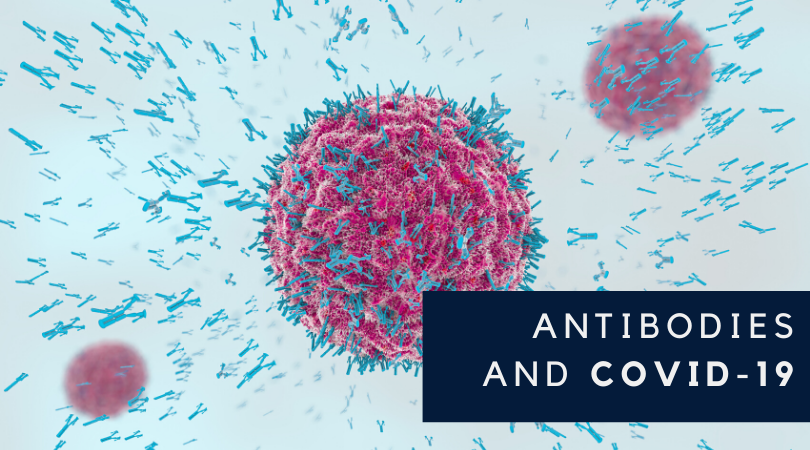How Antibodies Work and Why They’re the Key to Controlling COVID-19
Posted on
As the world continues to be affected by the coronavirus pandemic, scientists are working on ways to get us back to normal. Antibodies may be the key.
 Researchers have known the role antibodies play in immunity since the late 19th Century, but the concept has entered the spotlight recently as healthcare experts and scientists race to find a way to slow down or stop COVID-19 and make it safe for communities to lift quarantines.
Researchers have known the role antibodies play in immunity since the late 19th Century, but the concept has entered the spotlight recently as healthcare experts and scientists race to find a way to slow down or stop COVID-19 and make it safe for communities to lift quarantines.
What Are Antibodies?
An antibody is a blood protein produced by the immune system in response to the presence of a foreign substance. These foreign substances, called antigens, can include viruses, bacteria, venom, toxins, drugs, certain proteins in foods, and even red blood cells from other people.
When the body encounters a possibly harmful antigen, it manufactures a specific antibody for that antigen. The antibodies recognize their matching antigens, attach to them, and remove them from the body. Antibodies are created in response to a specific antigen and are only effective at fighting that antigen, which means antibodies for Disease A will be ineffective against antigens from Disease B (which is why the flu vaccine won’t work against coronavirus or any other disease).
The History of Antibody Research
In 1908, physician and scientist Paul Ehrlich won the Nobel Prize for Physiology or Medicine for his work in immunology. In an attempt to understand disease resistance, Ehrlich fed laboratory mice increasing doses of the poisons ricin and abrin. After a few days he observed that the mice fed ricin had developed a resistance to it, which continued for several months. While seemingly immune to ricin, the ricin-fed mice had not developed a corresponding resistance to abrin and were still as susceptible to abrin as mice that were not part of the experiment.
Ehrlich later used mice to test inherited immunity, and eventually concluded that antibodies could be passed from the mother to the child in vitro or through breast milk, though the resulting immunity was not long-lasting. Based on his research, Ehrlich theorized that if a compound could be created to selectively target a disease-causing substance, a toxin could be created to fight that substance.
In 1973, biologist and geneticist Jerrold Schwaber was able to produce antibodies using human-mouse hybrid cells called hybridomas, though the antibodies produced did not last long and did not target any known antigen.
In 1975, Georges Köhler, César Milstein, and Niels Kaj Jerne, succeeded in making hybridomas that made antibodies to known antigens. The three shared the 1984 Nobel Prize in Physiology or Medicine for their discovery.
Antibodies & Immunity
It can take days to weeks for the body to develop antibodies after an infection, but once created those antibodies don’t leave the body right away. Antibodies stay in the system for varying amounts of time depending on the illness. For example, antibodies to SARS stay in the body for about two years after infection, and antibodies for diseases including measles and chickenpox stay in the body for life protecting against infection.
Though COVID-19 is known to generate antibodies in the people it infects, no one knows yet how long those antibodies last, or what level of immunity they provide. That piece of information is crucial to knowing when it’s safe for people who have already had COVID-19 to return to work and re-enter public life without fear of re-infection.
The Food and Drug Administration (FDA) has already approved at least one antibody test for SARS-CoV-2, the coronavirus that causes COVID-19. Unlike swab tests, antibody tests do not detect current infection with the virus, they only identify whether someone has had previous exposure to COVID-19. It takes antibodies some time to develop after exposure to the antigen, so antibody tests must wait until someone has been fully recovered for at least two weeks.
While antibody testing is a good first step, there are still a lot of unknowns, including how long COVID-19 antibodies stay in the body, what level of future immunity they provide (if any), and whether a person with COVID-19 antibodies is still contagious.
There are also issues with the antibody test itself. There are several types of coronavirus, including the one that causes the common cold, so many of the antibodies generated to fight other types of coronavirus may show up as false positives on a COVID-19 antibody test.
Once those issues are resolved, antibody testing, when used in conjunction with other testing and tracking efforts, could be the key to helping the world get control of the pandemic.